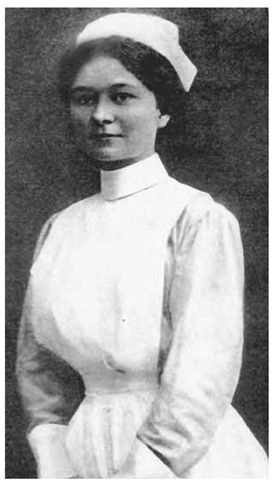(1884-1918)
The first American nurse to die while serving at the front in World War I. She served with the American Expeditionary Forces from May 1917 until her death in France in January 1918. Born in Milton, Pennsylvania, in 1884, Helen grew up in a well-to-do farm family with three sisters and four brothers and graduated from the Pennsylvania Hospital nursing school in 1913. She was among a preparedness medical team from Pennsylvania Hospital in Philadelphia who had pledged to the Red Cross to mobilize in the Army Reserve Corps in time of war. On Sunday, May 2, 1917, three weeks after the United States officially entered World War I, the twenty-three physicians and sixty-four nurses of her unit, Base Hospital Number 10, received orders to mobilize and prepare for departure to France. On May 19, 1917, the unit sailed to Le-Treport, a fishing village on the Normandy coast to relieve the staff of the British-run, 2,000-bed General Hospital 16 (renamed Pennsylvania Base Hospital 10).
On July 22, 1917, five days after arrival at LeTreport, Helen Fairchild was sent on the first team with two physicians and an orderly to work at the front in Belgium near Passchen-daele at Casualty Clearing Station Number 4. Casualty Clearing Stations were mobile units that served as the first step in the chain of medical evacuation from the front lines. Subjected to regular bombing attacks, the medical staff slept under the floor of their tents in shallow dugouts covered with a hinged section of the tent floor lined with a piece of sheet iron. "We . . . wade through mud to and from the operating room where we stand in mud higher than our ankles," she wrote to her family (Fairchild collection).
Fairchild served in Station 4 during the third battle of Ypres, often working twelve to sixteen hours daily in the operating room. Internal and external blisters from mustard gas accounted for many of the wounded, and medical personnel as well became ill from vapors clinging to their clothing. Despite their grueling work, Helen later wrote, "it really has been surprising to me that the various hospitals are as well-fitted up as they are and that the men are gotten off the field so rapidly after being wounded" (Fairchild collection).
Casualty Clearing Station 4 temporarily closed August 17, 1917, a day of the heaviest of bombing and gassing to that point. Helen evacuated to Base Hospital 10. In early October, she became ill, suffering from severe abdominal pains. Her condition slowly progressed to jaundice and anemia. She requested exploratory surgery for suspected ulcers, lapsed into a coma following the operation, and died on January 18, 1918. According to autopsy reports, her death resulted from "acute yellow atrophy of the liver" and chloroform poison. Later medical analysis concluded that exposure to mustard gas through patient’s clothing probably exacerbated her condition.
Helen Fairchild.
She was buried with full military honors in a small cemetery at LeTreport and later removed to Somme American Cemetery and Memorial at Bony, France.

